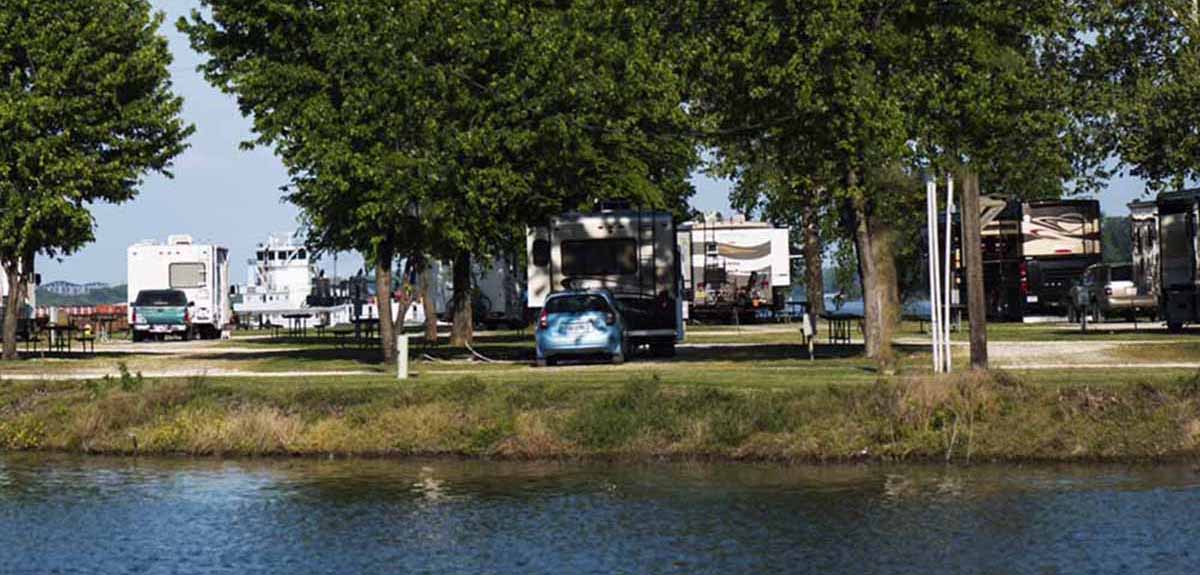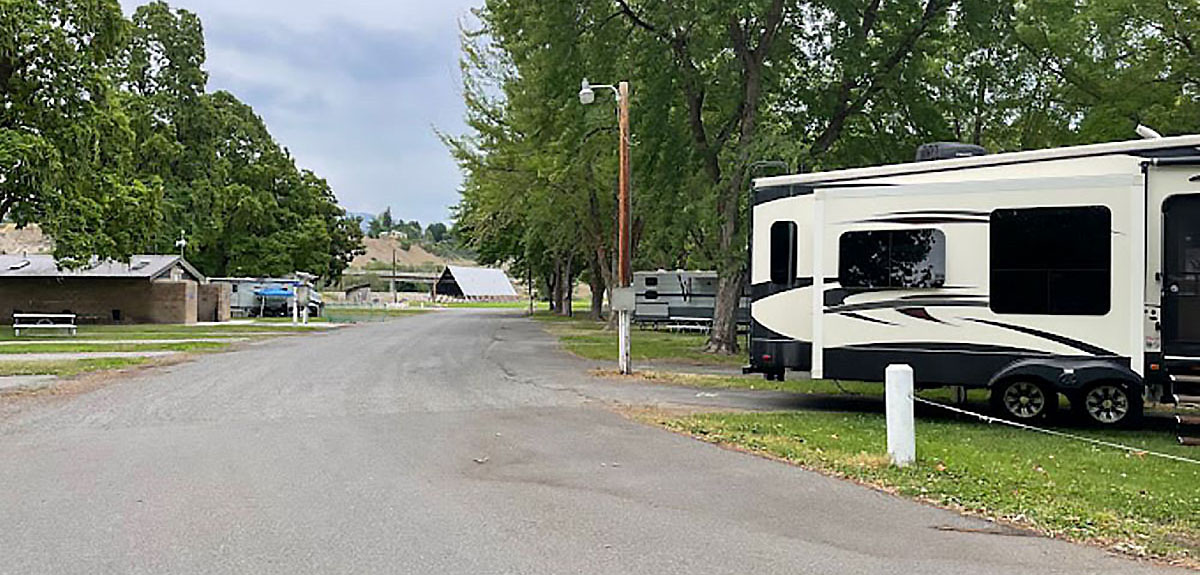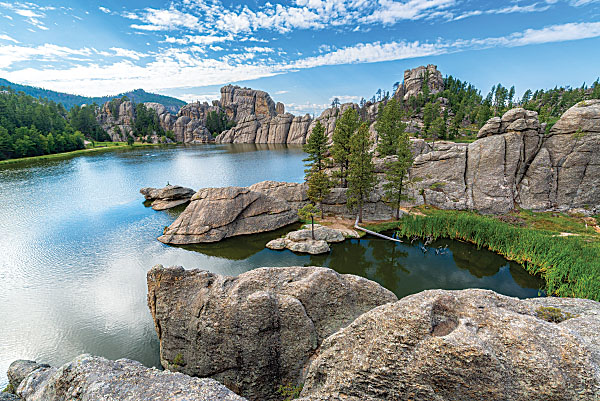How to Plan an RV Trip
Image Caption:
RVers love planning trips. Think for a moment about the endless and exciting possibilities. There are countless must-see destinations across North America, and thousands of RV parks and public campgrounds. When RV enthusiasts strike up a friendly conversation, it’s never long before they’re swapping travel recommendations and campground reviews. For many seasoned RVers, their favorite question is, “Where to next?”
Now, some folks might have the notion that RV travel is all about spontaneity. You hitch up your rig and hit the road with nothing but a full tank of fuel and a love of adventure. It’s a nice idea in theory, but in reality, a completely unplanned RV trip can lead to stress and disappointment. After all, RVing is more popular than ever right now, and many campsites are booked a year or more in advance, especially during peak seasons.
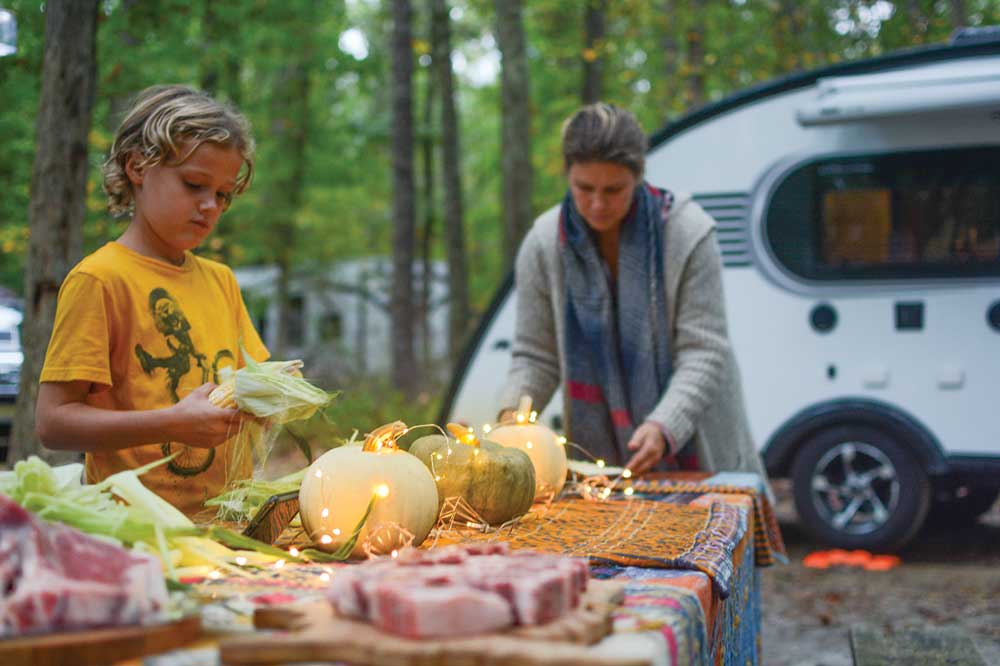
Campgrounds at public parks often have spacious and secluded sites, perfect for outdoor meals and activities.
Making plans in advance not only confirms you’ll have a place to stay, it lets you take advantage of all the great crowdsourced information now available online and learn helpful details like the quirky hours of a craft brewery or discounted weekday tickets at a museum. We’ve found that trying to achieve balance works best: plan ahead but leave plenty of room for spontaneous experiences and relaxation.
Know Yourself… and Your Budget
Remember all those options that were available when you were RV shopping? Whether you bought a teardrop trailer with a wet bath or a luxury fifth-wheel with massaging theater seats, you had to figure out what you wanted from the RV experience. Similarly, before planning any trips, you should have a good idea of your personal travel style and what you are looking to get from an RV vacation.
5 Questions To Ask When Choosing a Campground
1. Can my RV fit in the campsite?
2. Does it have the hookups I want (water, electric, sewer, cable)?
3. Does it have the bathhouse features I want (flush toilets, hot showers, reputation for cleanliness)?
4. Does it have the amenities and activities I enjoy (playground, swimming pool, laundry, Wi-Fi)?
5. How far is it from the area attractions I plan to visit?
5 Questions To Ask When Choosing a Campsite
1. Do I want a back-in or pull-through campsite?
2. Do I want to be near or far from
the pool, playground, pet area or bathhouse?
3. Can I hear road noise from the site?
4. Does a lot of campground traffic pass the site?
5. Is the campsite shaded or sunny?
The most important thing to know is how many hours you are comfortable driving on any given day. If you like to drive no more than five hours at a stretch, choose locations that are closer to home or plan plenty of interesting stops along the route. If you’re a road warrior who can clock 12 hours behind the wheel without stopping for a cup of coffee, it’ll be much easier to reach those far-away destinations.
Another point to consider is how often you like to break camp. Travel days can be tiring with all the packing, hitching up and driving, and then setting up at a new campground. Some folks are happiest doing this only one time on an RV trip and opt for single-destination travel. Others love to see as many places as possible on a trip and will relocate every few days.
We love picking a few destinations within a region and staying at each place for three or four nights. However, we know plenty of others who are content to spend an entire two-week vacation at a single RV resort. Finding your own rhythm will make those RV trips as amazing as you always dreamed they would be.
Finally, you have to know your budget. There is no such thing as the average cost of an RV vacation. Expenses vary tremendously depending on how far you drive, the destinations you visit and the types of campgrounds you book. Remember that the more you drive, the more you will spend on fuel, and that can be a big expense when hauling a large RV with a powerful tow vehicle.
To complicate things further, campground costs are all over the map. We’ve paid $20 a night for a remote state-park campsite with no hookups and $120 a night for a waterfront-resort site with a custom stone firepit. You can plan an RV trip at virtually any price point, but you’ll likely be happier if you aren’t blowing the family budget.
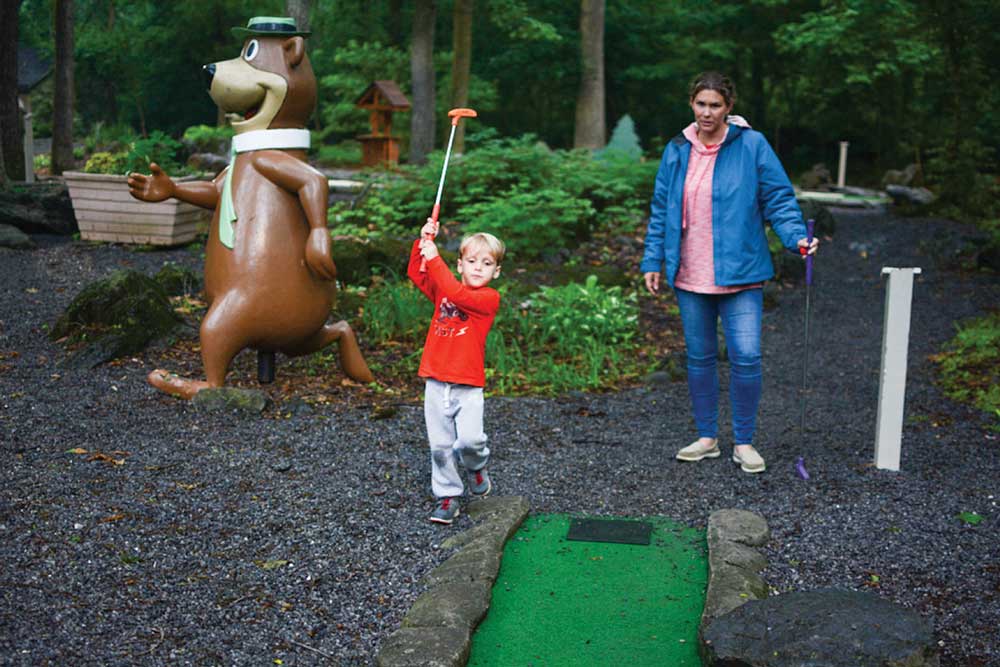
Full-service RV resorts, like the Yogi Bear’s Jellystone Park pictured here, offer on-site activities such as mini golf.
Choose the Ideal Destination
If you want to plan a truly memorable RV vacation, you have to pick a destination that ticks off all your travel boxes. Of course, people rave about the beauty of the Grand Canyon, but if you hate heat, crowds and hiking, it’s probably not a good choice for your summer trip.
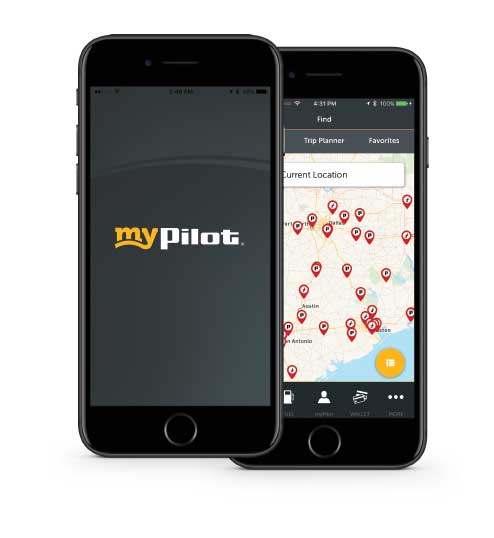
Pilot Flying J is known for its RV-friendly fuel stations, and the myPilot app maps them all. The app is handy for finding fuel prices, making cardless fill-ups at the pump and tracking rewards.
To limit our choices, we usually decide on the type of destination first. For instance, we’ll pick between the beach, the mountains, the city or the tourist attraction. We’ll decide whether we want to be active, take it easy or a combination of both. We’ll discuss whether we want it to be an educational trip for our kids or just a chance to relax and unwind as a family. Then we’ll look at the options within our preferred traveling distance.
One of our favorite things about the RV lifestyle is that we can comfortably enjoy any type of destination, whether it’s Olympic National Park or the Big Apple. The best RV trips happen when we pick a destination that suits the season and our mood.
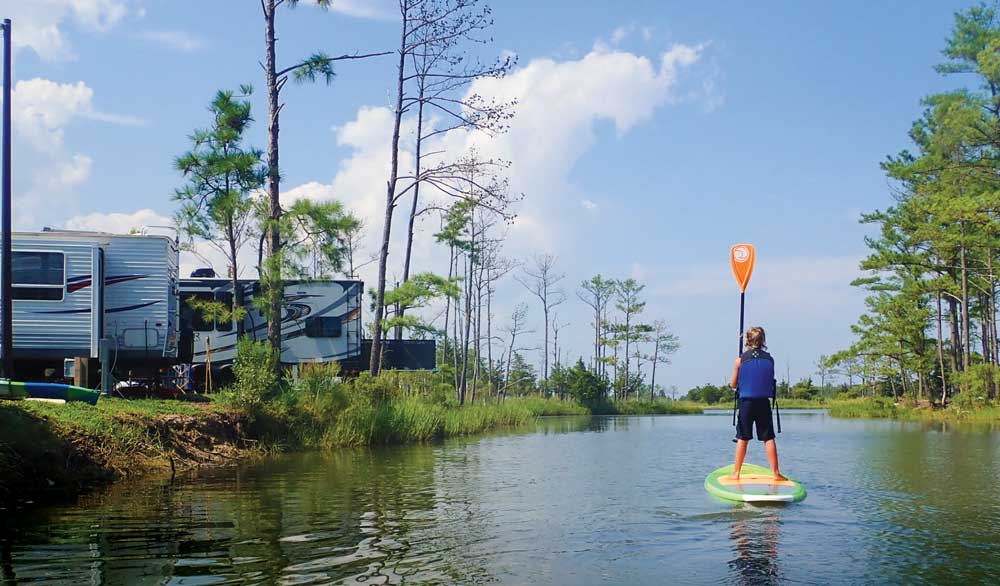
Massey’s Landing in Millsboro, Delaware, is one of many RV resorts that rent recreational equipment such as standup paddleboards, kayaks, canoes and pedal boats.
Find the Perfect Campground
Once we decide on a destination, we dive into campground research. Finding the most suitable campground is more of an art than a science, simply because everyone has different ideals. While there is no such thing as one perfect campground for all of us, there are perfect campgrounds for you. With a bit of research and reconnaissance, you can find them.
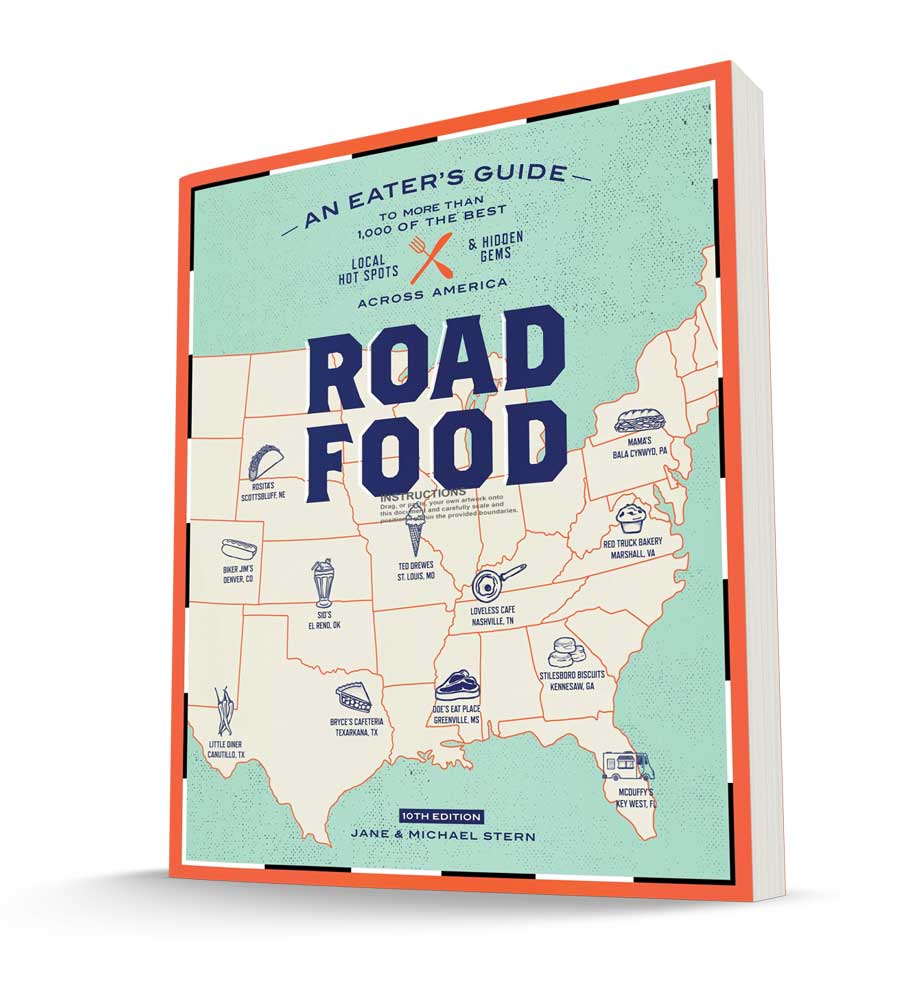
There are so many online resources these days, but the go-to restaurant resource during our travels is still Roadfood by Jane and Michael Stern. This is a classic guidebook, now in its 10th edition, and we have a well-worn copy that lives in our RV. The book’s recommendations have given us countless extraordinary food experiences over the years, and we consider it an RV travel crime to miss eating at an official Roadfood joint when in the area. If you are traveling on a tight budget or with kids, try to visit recommended restaurants for lunch rather than dinner. You’ll save a ton of money and have a more relaxed experience.
It’s important to know the basic amenities that you want in a campground. Some RVers prefer a huge site with no hookups and a whole lot of peace and quiet. Others are looking for a heated swimming pool, modern playground and planned activities. Well-reviewed resorts, no matter how lovely, will not be a good fit if you prefer rustic state parks. It’s important to seek out recommendations and reviews, but then do your due diligence to find your own campsite nirvana. And if you’re traveling with a pet, never forget to double-check campground policies.
When making reservations, remember that even the best campgrounds have some less-than-ideal campsites. Everyone loves the convenience of online booking, but we believe that calling the campground and discussing our preferences often lands us the best sites. Not every campground will guarantee a particular campsite, but we take advantage when they do.
Plan the Best Itinerary
There’s a well-worn joke about folks needing vacations to recover from their vacations. We actually think RV travel is uniquely suited for combining fun and adventure with rest and relaxation. This is on account of two things: traveling with all the comforts of home and enjoying the benefits of campground culture.
While we love to get out and explore new destinations, we schedule plenty of downtime at the campground. This works perfectly for our family and seems to be a tried-and-true strategy of seasoned RVers.
We generally look to plan a single outing or excursion per day, whether it’s a hike, a guided kayaking tour or a visit to the local botanical garden. This means we don’t rush from one thing to the next, and we never get burned out halfway through our trip. It also allows room to squeeze in unexpected finds or recommendations. We’re pretty sure one of the reasons we have such unforgettable vacations is that we’re always asking locals and fellow RVers for suggestions.
Crowdsourced Strategies
Social media has opened the doors to getting recommendations from other travelers. We check RV-park reviews on the Good Sam Club website and other sources. Before visiting a destination, we love looking for inspiration on Instagram. We follow local convention and visitor bureaus’ social-media sites, along with those of nearby national and state parks. This gives us ideas for popular regional attractions and off-the-beaten-track gems. We also follow local hashtags to find the trendiest dining and shopping destinations.
Before we arrive at any vacation destination, we make a list of must-do activities and attractions for the trip. We research days and hours of operation in advance, and make sure to buy tickets for anything that requires reservations. So many people are devastated when they find out that all the tours of Alcatraz Island are booked or that they needed to enter the permit lottery to visit parts of Zion National Park. We’ll never forget the time we tried to bring our children to the top of the Washington Monument only to find the reservation system had been changed. We don’t make that mistake anymore. Do your homework and don’t miss out for lack of planning.
Map the Right Route
The best part of trip planning might be researching destinations, campgrounds and attractions, but there are a few other (perhaps less exciting) items that should be on your trip-planning checklist as well.
The most important of these might be planning the route. When towing an RV, you want to make sure not to end up on a road with low clearances, steep inclines or narrow passes. Many of us rely on smartphone navigation for everyday driving directions. When planning an RV trip, take the time to plot your route in advance, and download maps and directions so they are available even if you lose cellular service.
You should also look for resources that help with finding RV-friendly gas stations and rest stops. Apps like Next Exit and GasBuddy offer information about nearby gas stations, including fuel prices and crowd-sourced photos. We love the myPilot app, which gives information about Pilot and Flying J stations, many of which have dedicated RV gas lanes, propane for sale and dump stations.
Get Ready to Go
Nothing can ruin the vibe of a great vacation more than an emergency maintenance issue with your tow vehicle or RV. Planning ahead will give you the best chance of arriving at your destination without incident.
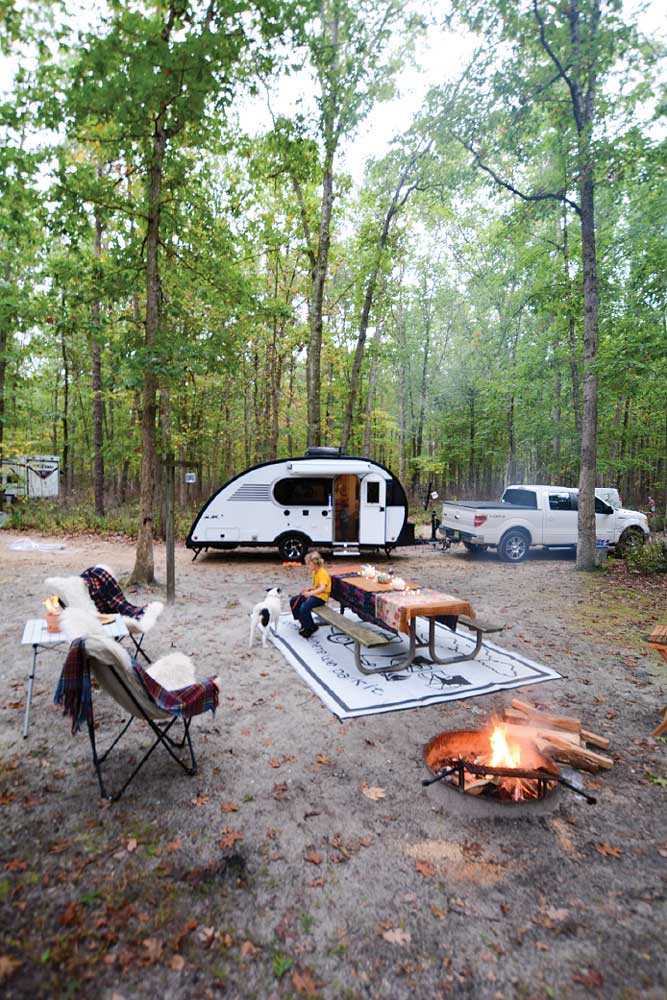
Coveted sites in public campgrounds have become more challenging to reserve, particularly during peak seasons.
We always double-check our tow vehicle in advance, making sure any scheduled maintenance has been addressed, including oil, other fluids and brakes. We take care of our travel trailer, regularly maintaining the axles, wheel bearings and tires. Our trip-planning checklist extends to a review of auto and RV insurance and roadside-assistance policies.
Lastly, you need to plan ahead for your sticks-and-bricks abode. Advances in smartphone technology offer RVers the opportunity to keep an eye on their homes, even while thousands of miles away. If you don’t have an app that lets you turn interior and exterior lights on and off remotely, set some timers on them. Make arrangements to pause newspaper delivery, have the post office hold your mail, and ask a neighbor or friend to check on the house periodically and remove those unwanted flyers left at the front door.
The RV industry has exploded in the past few years, and that means it’s more important than ever to do at least a bit of trip planning before you hit the open road with your rig. Last year we witnessed RVers being turned away at more than one campground office simply because there were no sites available. Booking your stay in advance will make sure that doesn’t happen to you.
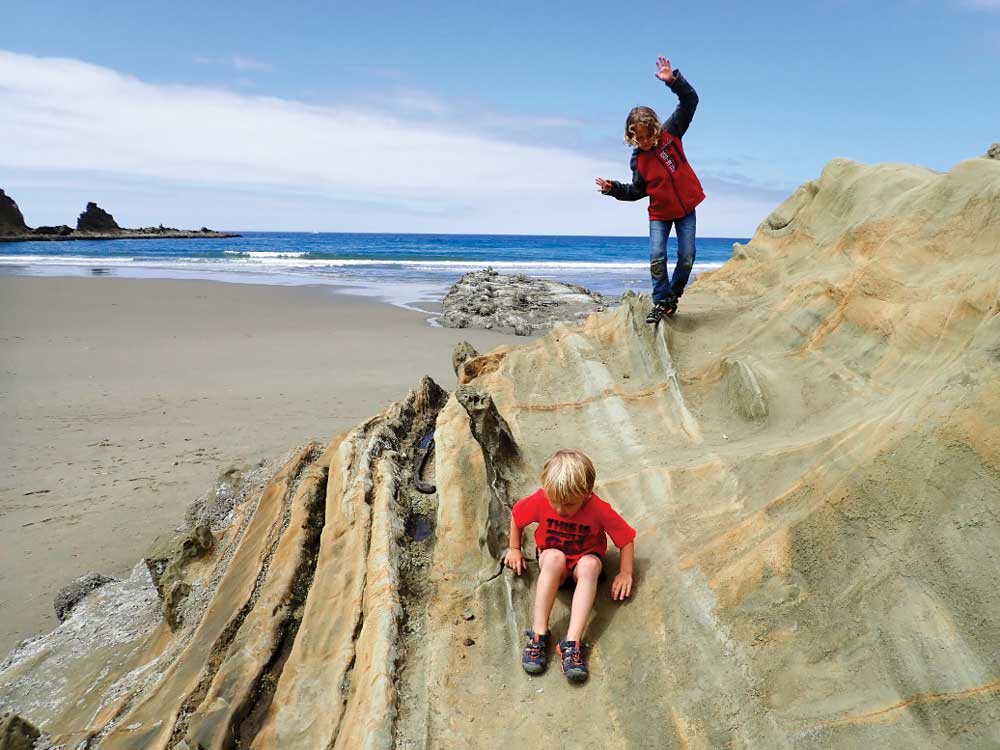
Taking shoulder-season trips makes for quieter camping experiences and a better chance of having the beach to yourselves.

